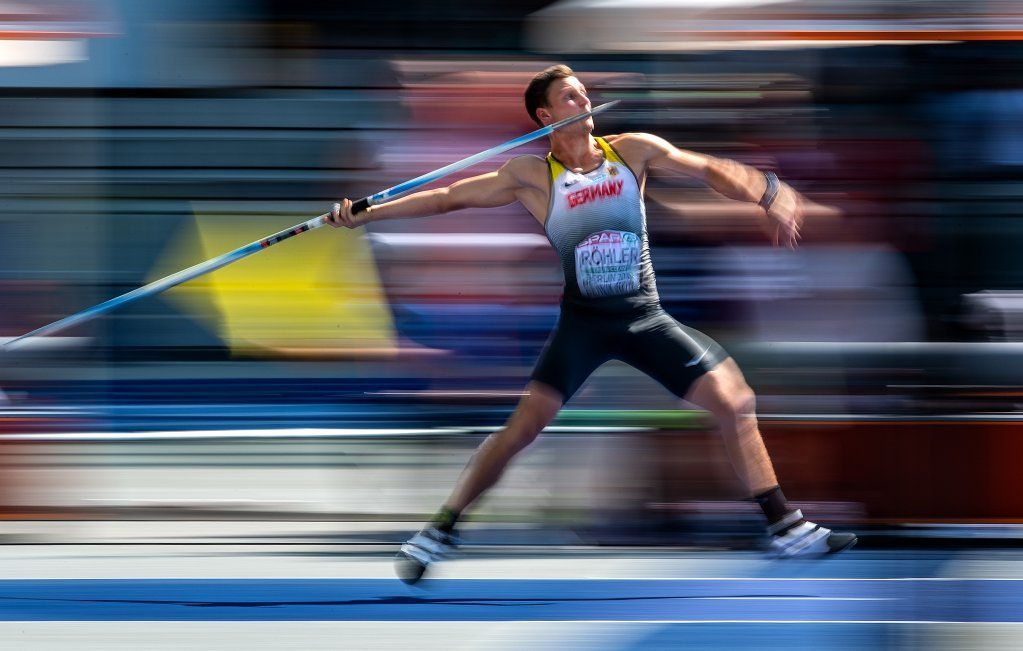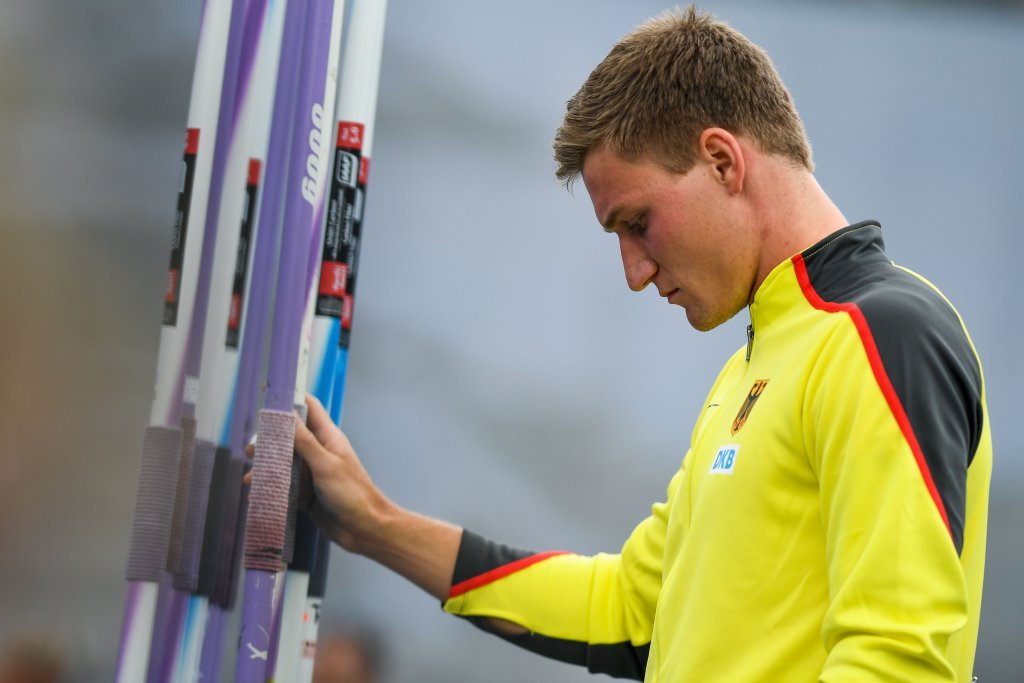Thomas Röhler: Javelin Misconceptions and Munich 2022
In the past, there was nothing for Thomas Röhler other than winning, either he finished the competition with a gold medal around his neck or did not stand on the podium at all. "That is javelin throwing. That's also a bit of an all-or-nothing mentality," the 30-year-old says today. The 2016 Olympic javelin champion and reigning European champion returns after several years plagued by injuries. We sat down with the athlete in an exclusive interview. Because this season, nothing less than defending his European title at another home European Championships is on the agenda.
But this season there is a minimum goal even before that. "For me, it's first about just getting back on track after a few really stupid injury years and covid years." It's supposed to be the uphill climb after the ongoing downhill slide of his rollercoaster career. And things are indeed looking up.
That was evident in the first training camps this year. "I'm really happy, the training results are back where they should be. The body is simply responding the way I want it to, it's sending the signals I want it to. It also feels bad sometimes, and that's completely okay."
EVERYDAY LIFE AS AN ATHLETE
Usually, the Thuringian trains twice a day for about one and a half hours, five days a week. But "being an athlete is by no means over after the on-site training." You need to focus on active recovery such as ice baths and physiotherapy and training analyses. It's "a huge challenge to reconcile family and top performance sport." During the competition season, there is also the travelling. "We travel a lot and have about 15 competitions a year that take place outside of Germany."
This year's first event will even take place outside Europe. The season opener for Röhler is the Diamond League Meeting in Doha on 13 May. While the last scheduled competition is not until September. "It will be a long competition season. I've been away from competitions for a long time, which means that the process of working with competitions again is starting now."
© Matthias Hangst/Getty Images
EUROPEAN CHAMPIONSHIPS, TAKE TWO
And this year there are many top-class competitions on the agenda. Among them are the European Championships in Munich. The renewed home European Championships on the occasion of the 50th anniversary of the Olympiapark has a very special significance. Röhler has been the reigning European champion since the first edition of the European Championships in 2018 due to the cancellation of the 2020 European Championships. The multi-sport event was split between Glasgow and Berlin at the time. Since the home victory, he often hears the same question: "I was often asked the question 'Olympic victory or European Championships 2018?' and I always had to think about it. And that shows that the event was so special."
The Olympics reign supreme, he says, "but emotionally I have to say 2018 got to me." The jump into the water pit shows that ecstasy. Röhler says the 2018 European Championships were like an adaptation of a movie script. Five javelin throwers had what it took to win, but ultimately it was, the formerly too-slim field athlete, who was crowned European champion.
"That home crowd feeling, that's special, that stays. It's the same at home meets. It's always something special to compete in the national jersey. All athletes would probably agree with that." Four years later, the European Championships return, this time united in Munich and with nine European Championships on the programme.
MUNICH 2022
No new stadiums or halls have been built for the competitions. Instead, most of the competitions will be held in the original 1972 arenas. "I think it's super sustainable. It's just using sports venues that are there. It's inviting sports that fit together. The fans just have a cool product."
This togetherness is what makes the multi-sport event special for the javelin thrower. And he himself hopes to get to watch other sports. But which one most? "Next door: gymnastics. I think it's cool, I'm a total fan. It's also part of our training. [...] Javelin throwing is very much characterised by mobility and functional movements and also coordination. And that's all reflected in gymnastics as well." Timewise, however, it will unfortunately be difficult for Röhler to follow other sports, as the focus is on his own competition. Therefore, the thrower will not see the men's apparatus finals, as they will take place on the last day (21 August), just like the javelin throw final.
© Matthias Hangst/Getty Images
However, the European Championships Munich 2022 already start on 11 August, among others with gymnastics. Maybe he can spare an hour for active regeneration and inspiration then.
There is no lack of alternative pastimes with the nine Olympic sports and the festival "The Roofs". There is also bound to be a common window of time to get to know the mascot Gfreidi better and test the squirrel's athleticism. "I'm looking forward to seeing Gfreidi throwing javelins then."
© David Ramos/ Staff/ Getty Images
EXCEPTION TO THE RULE: THE JAVELIN AND BRAKING
The mascot will have a hard time learning how to throw the javelin, however, because it is fundamentally different from all other disciplines in athletics. "We also like to describe it as a human crash."
All disciplines’ focal point is acceleration, only the javelin throwers focus on braking instead. When the run-up is slowed down abruptly, the energy is at best transferred - in its entirety - into the speed of the javelin by means of impulse transfer. But this requires certain essentials: "If this braking is disturbed, i. e. due to technical errors or slipping of the foot, then of course the javelin does not fly well. [...] That's why it's so important to really have a good track that can withstand the athlete." This is always a point of discussion. But weather conditions, footwear and one's throwing technique also play a role.
"So, the perfect sprint track is definitely not the perfect javelin track. That's a given." But Röhler is satisfied with the tartan laid out so far, which he inspected in the Olympiastadion in spring. The rest of the track is not yet ready for a cross-check by a sprinter.
MISUNDERSTANDINGS ABOUT JAVELIN
Many assume that strength is crucial in sprinting as well as javelin throwing. "I think that's a misconception that's prevalent all the way up to the youth level." At his coaching camps in Jena, the former German record holder explains that distances of up to 70 metres can and should come from technique alone and not from strength. Nevertheless, Röhler says he himself is far from perfect. One could even make a substantial list of his errors, despite his success and personal best of 93.90 metres.
Still, Germany is one of the most successful javelin-throwing nations in the world, how come? According to the man from Jena, there just happened to be many puzzle pieces that fit into each other: a strong class of athletes, that has pushed the inner-German competition since their youth, a very experienced coaching team and an immense research advantage.
Therefore, an all-German podium at the World or European Championships is theoretically possible this year, he said. "We dream of it, have tried it again and again. Maybe it's meant to be in Munich."
© Tobias Schwarz/ Kontributor/ Getty Images
FROM JUMPS TO THROWS
Such dreams came late in his career. "I never planned to be an Olympic athlete or anything. It was just my hobby for a long time." Nevertheless, the Thuringian was able to turn this pastime into a career. He "always threw stones into the Baltic Sea as a little kid." But passion alone was not enough to make the squad.
"I was simply one of the guys who developed a bit more slowly." But even at the sports school, standards had to be met. In the triple jump he was able to produce them, otherwise the 2016 Olympic champion would have had to leave the sports school prematurely. "My heart was always hung up on the throw, though, but it didn't make sense. I was just too slim."
With a new coach, changes at the base, and a subsequent transition year in the decathlon, Röhler arrived at the javelin throw at the late age of 18.
DAD AND ROLE MODEL
The Olympic champion also wants to keep all options open for his almost two-year-old son, even if it doesn't look like it at times. "Children watch you, I had to realise that too. Without me teaching him to throw the javelin, he's already running through the hall with the foam rocket, and it looks like someone has taught him. But I swear we haven't," he says with a laugh.
He simply enjoys being an approachable, tangible role model for kids or even new talent. "I think it's nice when kids recognise athletes while grocery shopping. Pointing is also completely okay, and then go 'I know him, and he's completely normal.' That's actually nice."




